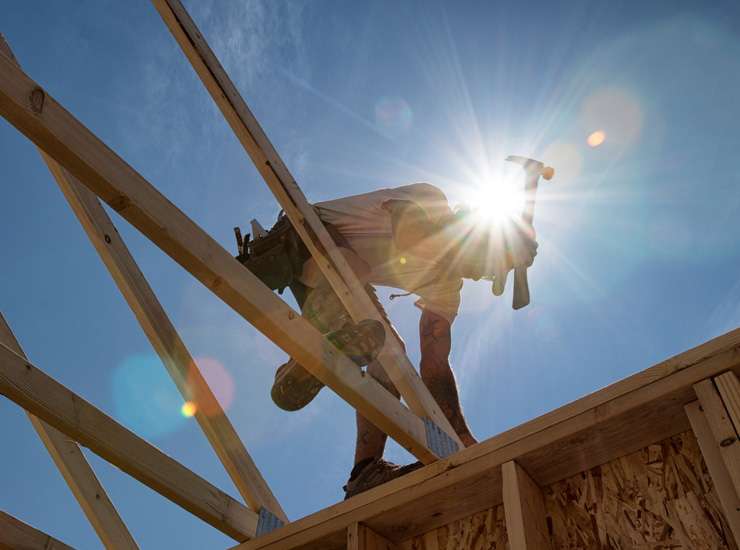The jury is still out as to whether the hot house prices being seen around the country constitute a fully-fledged boom.
Nick Tuffley, the ASB’s chief economist, says the market is heating up and the bank expects prices to rise at a peak rate of about 12 per cent over the year to June 2021.
READ MORE: Find out if your suburb is rising or falling
“We’re getting a bit of a boom, in the sense we’re getting people responding to interest rates in the way they normally do.”
Start your property search
Some of the more extreme fears over job security have faded and now the country has come out the other side of a major lockdown many people will be feeling more comfortable about their financial security.
Many are starting to look at their options, such as first home buyers recognising servicing debt on a house is looking more attractive than rent, and with the borders closed people are spending more time at home and spending money on a new car, home improvements or upgrading the house.
The big thing dominating the market, though, are the extremely low interest rates.
“I think the unusual bit about what’s happening is it’s at a time where unemployment has been rising and we are going through some tough times, we know that.
“We know there are a number of businesses under a lot of pressure and there are some households facing challenges – but there’s a huge part of New Zealand which just looks like it’s sailing on and responding to these really low interest rates.”
Cost of supply
This is not all good news, however.
“The big red flag, or warning, is that we’re back into this haves versus have nots, where people who can get in and buy houses will tend to do well.
“Those who can’t, we’re getting that divide being created and we’re not solving the long-term problems of why houses are relatively expensive here in New Zealand which is around the cost of supply.”
Part of the reason for a chronic housing shortage is the challenge of building cost-effective homes quickly, Tuffley says.
Solving that is easier said than done but not doing it creates inequality and affordability issues through high house prices.

Building cost-effective houses has been a challenge. Photo / Getty Images
“It’s a challenge we’ve been trying to crack for some time. Under the National Government it started to become an issue then tempered itself a little bit under the last parliamentary term but it’s clearly going to be more of an issue and concern going forward if we continue to see some strong rises in house prices.
“We’d expect (this Government) would be looking much harder at it and will have a bit more capability to get through the legislation that will enable it as well.”
Extraordinary sales
Lesley Harris, from the First Home Buyers Club, says we are in a stable market, not a boom.
New Zealand has become an even more attractive place to come back to and live so there is probably more demand and we are seeing price increases, “but I certainly wouldn’t call it a boom”.
“I think there are some isolated, extraordinary sales but I’d want to see that repeated month after month after month before I said it’s a boom.”
Harris says she knows many investors getting out of the market because of all the legislation around being a landlord and for first home buyers it’s not a bad time to buy.
“I certainly would say it’s not going to slump but I’ve been saying that for a long time. I also think we’ve got to take into consideration any slight increase in property values because of there being more demand has to be weighed against ‘my, God, we’ve never seen 2.5 per cent interest rates’.
“If things are slightly more expensive to buy it’s being offset. If you’ve got a mortgage it’s sort of neither here nor there because you’re not paying more weekly.”

Covid’s effect on the economy hasn’t been fully assessed yet. Photo / Getty Images
Harris says a boom would be six months of exponential growth last seen around 2015 to 2017 after the Global Financial Crisis.
“For me a boom is not a few months post-Covid. At the moment it’s just too early to tell. The world’s gone a bit crazy with Covid. I think we’re going to know more coming into first quarter next year once everything washes out, but we also don’t know are we going to have another big outbreak in New Zealand, are we going to see an economic slump?
“I don’t think we’ve seen the overall impact yet on our economy and we haven’t seen the overall impact on global economies. It’s surging around the world and we’ve got it fairly well under control but New Zealand isn’t an isolated economy.”
‘A bit crazy out there’
Mortgage broker John Bolton, from mortgage company Squirrel, thinks the property market is going through a boom - but a weird one.
“Clearly, house prices are going up at the moment and clearly it’s a bit crazy out there. Property is confidence-driven so when people are feeling more confident they’re more likely to want to dive into the property market, which is weird given Covid and the state of the world.”
He, too, points to interest rates, saying there is a strong correlation between house prices and interest rates.
“All you’re really seeing at the moment in the property market is the impact of a pretty significant reduction in interest rates and it’s flowing through to house prices.”
New Zealanders pay more of their after-tax income on housing compared to some other countries.
“If you want a rule of thumb, if you want to break New Zealand down to one very simple number, it’s that Kiwis are on average prepared to spend up to about 45 per cent of their after-tax income on property, whether they’re paying rent or supporting a mortgage.
“We’re probably at the more extreme end but that’s because we really value properties that we live in. If you think about the types of properties we live in and the things we value, you know, a bit of land, open space, not too close to the neighbours, proximity to parks, cafes and that sort of thing, we’re prepared to pay for it.”
The impact of Covid is adding to the sense of how important home ownership is, Bolton says.
Pre-Covid some people had other priorities, such as travelling overseas, but now they are saying “we can’t do that” and are looking to own a home.
“And if you’re remote working, where you are remote working from is important. You can’t work on the kitchen desk. There is a change occurring. I always think back to Maslow’s hierarchy of needs and it basically says the two most important things in the world are food and shelter so I think home ownership has really cemented itself back again as a goal.”
Bolton does question how long the confidence will last. “Will the economic reality of our post-Covid world sink in at some point? Nobody knows the answer to that.”
The Government may also look to put LVR restrictions back in place which would take some of the heat out of the market, though, the fear of missing out phenomenon being seen could be hard to halt.
“I think people are genuinely concerned they might miss out, that house prices are going up too much and if they don’t buy now they’ll be even higher next year.”
















































































